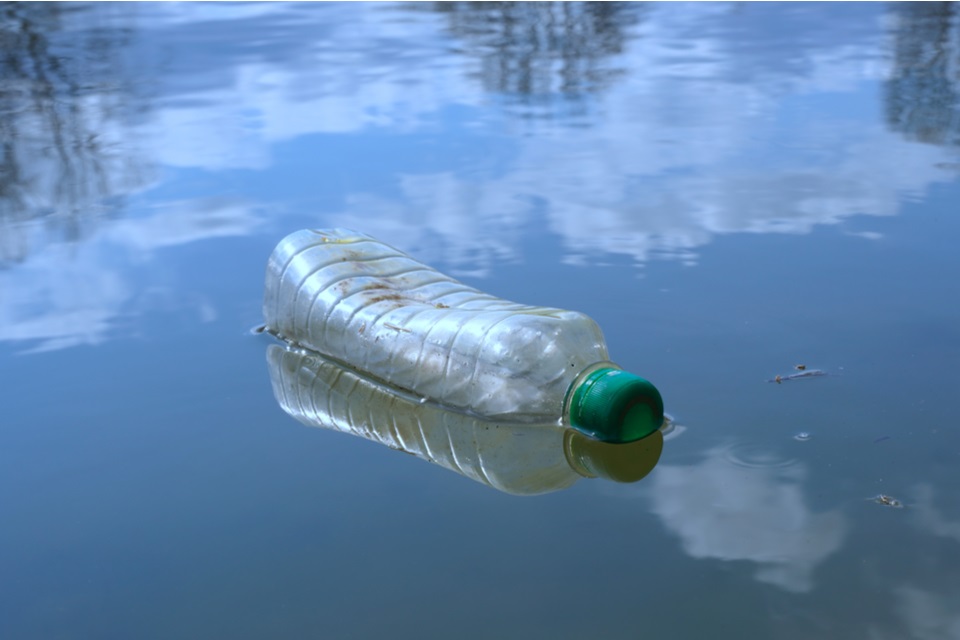Plastic pollution in lakes provides a habitat for microscopic algae, research finds

Plastic pollution in freshwater lakes can become an established habitat for microscopic algae within just two weeks, according to new research.
Led by MSc student Imogen Smith, the researchers including Keele’s Dr Antonia Law and Dr Tom Stanton from the University of Nottingham, set out to investigate the impact plastic waste might have on colonies of algae within freshwater ecosystems such as lakes.
These microorganisms can remove CO2 from the environment and produce oxygen, and are key to the cycling of nutrients that drive aquatic food webs. Along with other microorganisms such as fungi and bacteria, algae form colonies known as biofilms on any submerged surfaces, but little is known about how they interact with plastic pollution, and how this might affect their activity or contribute to plastics breaking down into microplastics.
To investigate, the researchers placed plastic samples of Polyethylene Terephthalate, Polypropylene and Low Density Polyethylene into Knypersely Reservoir in Staffordshire, in areas of the water exposed to light (photic) and at the bottom of the lake where there is no light (aphotic). The presence of UV light influences biofilm composition and function and can also speed up the process of plastics breaking down.
This research, published in the Journal of Hazardous Materials, found that different types of algae developed on the plastics in the photic zone compared to the aphotic zone, and although the type of plastic did not lead to different types of algae, there were changes in the types of algae present in the biofilms over the six-week study. This is important because plastic pollution in lakes can act as a new habitat for microorganisms such as these and the increased presence of these organisms due to plastic pollution may have greater impacts on nutrient cycling and other organisms living in lakes.
Plastic samples also showed evidence of degradation within six weeks of being placed in the water, even in the absence of UV light. This was consistent across all three types of plastics that were studied (Polyethylene Terephthalate, Polypropylene and Low Density Polyethylene). These findings may indicate that algal biofilms may play a role in helping plastics in the bottom of lakes to break down.
Lead researcher Imogen Smith said: “The negative impacts of plastic pollution on the environment are well documented, particularly in marine environments. However, we identified a distinct lack of research systematically characterising the plastic-biofilm relationship in freshwater environments.
“Completing the study over six weeks allowed us to look at the evolution of the biofilms over time, which gave us an opportunity to study the implications of its fate in the environment. The findings have identified areas for future research which could help further understand freshwater plastic pollution as a habitat, and the impact of this on its degradation, at a larger scale.”
Dr Antonia Law added: “The presence of plastic pollution in lakes provides an additional habitat for microorganisms including algae, which will increase the quantities of these organisms in lake systems. This is important because algae are photosynthetic organisms and play a key role in removing CO2 from the atmosphere and producing oxygen and they also form the basis of food webs in lakes. The increased presence of plastics in lakes along with algae and biofilms may therefore have impacts on nutrient cycling and lake food webs and this is something that requires further research.”
Most read
- ResearchPlus: New collaborative of research-focused universities launches to give voice to critical research and innovation drivers
- Weather radar data reveals alarming declines in insect populations
- First cohort of Nursing Associate apprentices begin studies
- Harper & Keele Vet School’s veterinary degree receives RCVS approval
- Keele astrophysicists contribute to NASA-supported research discovering building blocks of life in neighbouring galaxy
Contact us
Andy Cain,
Media Relations Manager
+44 1782 733857
Abby Swift,
Senior Communications Officer
+44 1782 734925
Adam Blakeman,
Press Officer
+44 7775 033274
Ashleigh Williams,
Senior Internal Communications Officer
Strategic Communications and Brand news@keele.ac.uk.


